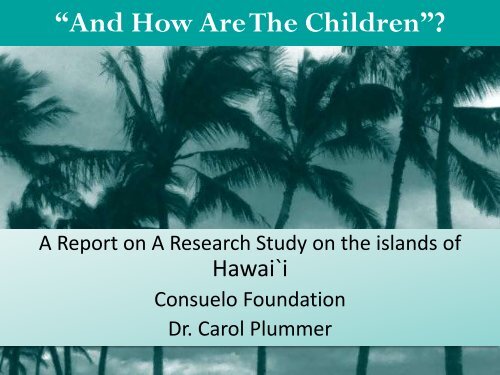"And How Are the Children?": Carol Plummer, PhD, LCSW
"And How Are the Children?": Carol Plummer, PhD, LCSW
"And How Are the Children?": Carol Plummer, PhD, LCSW
- No tags were found...
Create successful ePaper yourself
Turn your PDF publications into a flip-book with our unique Google optimized e-Paper software.
“<strong>And</strong> <strong>How</strong> <strong>Are</strong> The <strong>Children</strong>”?A Report on A Research Study on <strong>the</strong> islands ofHawai`iConsuelo FoundationDr. <strong>Carol</strong> <strong>Plummer</strong>
“<strong>And</strong> <strong>How</strong> <strong>Are</strong> The <strong>Children</strong>?”Study Details1. 8 sites2. 181 participants3. Committee guided4. Local partners andassistance5. Beginning of ongoingresearch program6. Checking and recheckingwith communities7. Accountability anddistribution
“<strong>And</strong> <strong>How</strong> <strong>Are</strong> The <strong>Children</strong>”?Agreement between Kupuna andService Providers• 1. Centrality of <strong>the</strong> economy/service cutbacks• 2. Need for Place-based decision-making• 3. Drug use and homelessness• 4. Interpersonal violence, related to stress andcommunication flaws• 5. Need for strong role models for teens and preteens• 6. Particular concerns about girls and teen pregnancy
“<strong>And</strong> <strong>How</strong> <strong>Are</strong> The <strong>Children</strong>”?Themes from Kupuna andService ProvidersEconomic Distress: Lack of Resourcesand Funding• “Funds get cut and projects are incomplete.”• “There are bad vibes about funding, how community isasked to participate again when things are left undone.Trust can be lost.”• “Nothing wrong with our children, <strong>the</strong>re’s a lot wrong with<strong>the</strong> system. Our state investment has shut down from 43workers down to three workers.”
“<strong>And</strong> <strong>How</strong> <strong>Are</strong> The <strong>Children</strong>”?Themes from Kupuna andService ProvidersPlace based solutions• “It seem as though <strong>the</strong>y come from an approach that <strong>the</strong>service providers will heal <strong>the</strong>se families. <strong>And</strong> I think that’s<strong>the</strong> wrong approach. Instead of teaching <strong>the</strong>m disciplines andskills or tools, whe<strong>the</strong>r <strong>the</strong>y be Native Hawaiian skills,Aotearoa, doesn’t matter <strong>the</strong>y have to heal <strong>the</strong>mselves.Because how long you with a family? <strong>How</strong> long <strong>the</strong> family with<strong>the</strong> family? Who should be healer? Who gon get <strong>the</strong> answer?You think you gon get <strong>the</strong> answer? The family get <strong>the</strong> answer.They know what’s up. They not lolo, <strong>the</strong>y don’t wake up thismorning and say <strong>the</strong>y gon be dysfunctional family for threedecades.”
“<strong>And</strong> <strong>How</strong> <strong>Are</strong> The <strong>Children</strong>”?Themes from Kupuna andService ProvidersDrugs and Homelessness• “<strong>And</strong> ice is a huge, huge problem, and it’s really hard to talkto people in families whose existence is kind of based on ice,with ice, so it’s really hard to talk to, and challenging.”• The basic needs aren’t met right now. Before I can say, “I gotthis resource. I can get you off <strong>the</strong> beach in two days.” Now,are you joking me? There are so many families on <strong>the</strong> beach.Everybody couch surfs. Kids are going to permanency becausepeople don’t have housing. It’s as bad as I’ve ever seen.
“<strong>And</strong> <strong>How</strong> <strong>Are</strong> The <strong>Children</strong>”?Themes from Kupuna andService ProvidersSmall community not addressingabuse and family violence• “There is only some (abuse) reported, so <strong>the</strong>reporting is low.”• “People feel helpless and powerless in <strong>the</strong> family. Itcan upset <strong>the</strong> whole family structure.”• “About sexual abuse, <strong>the</strong>re are generations of it,everyone knows but no one talks about it cause it isa small community.”
“<strong>And</strong> <strong>How</strong> <strong>Are</strong> The <strong>Children</strong>”?Themes: Kupuna FocusYouth lack Respect/Negative RoleModels• “<strong>Children</strong> are in violent, abusive, neglectful environments.”• “Drug use in <strong>the</strong> homes means that <strong>the</strong>re are inappropriatebehaviors and possible sexual abuse.”
“<strong>And</strong> <strong>How</strong> <strong>Are</strong> The <strong>Children</strong>”?Themes from KupunaLoss of Traditions and SpiritualGrounding• “More traditional component to <strong>the</strong> services and educationis needed.”• “The cultural piece is missing.”Throughout <strong>the</strong> dialogue, Kupuna strongly emphasized <strong>the</strong> importance of beinggrounded in a spiritual faith.
“<strong>And</strong> <strong>How</strong> <strong>Are</strong> The <strong>Children</strong>”?Service Provider ThemesService ProvisionProblems1. System flaws impair solutions2. Fears and misinformation keep peoplefrom intervening with problems3. Values clashes4. Communication and information gaps
“<strong>And</strong> <strong>How</strong> <strong>Are</strong> The <strong>Children</strong>”?Quotes from Service ProvidersSystem flaws impair solutions• “We don’t have enough programs that really go beyond <strong>the</strong> parenting class. Youcan’t send everybody to parenting class, it just goes so far. But programs thatreally help <strong>the</strong> parents to learn how to be good parents, I don’t know of anyparenting program that really does that.”•“<strong>And</strong> I think in a lot of cases we just have to work toge<strong>the</strong>r, really streng<strong>the</strong>n ournetwork as a community in terms of being able to say, look, this is not working.These are reasons why we have to give more authority to <strong>the</strong> people here whoknow exactly what’s going on.”
“<strong>And</strong> <strong>How</strong> <strong>Are</strong> The <strong>Children</strong>”?Quotes from Service Providers Challenge # 2 pg2Fears and misinformation keep peoplefrom intervening with problems• “A lot of parents, <strong>the</strong>y just don’t know how. They think what <strong>the</strong> way <strong>the</strong>ydoing things, that’s how <strong>the</strong>y were brought up and that’s <strong>the</strong> right way, but <strong>the</strong>safety of <strong>the</strong> children is number one. As much as <strong>the</strong> children love <strong>the</strong>ir parents,but it is a concern, child abuse and neglect on <strong>the</strong> island.”• “Sexual abuse on this island is rampant. It’s <strong>the</strong> last big secret. Almost everysingle family has somebody who has been molested. <strong>And</strong> those children youcan tell. You can tell because <strong>the</strong>y start using ice. They gain massive amounts ofweight, or <strong>the</strong>y push <strong>the</strong>mselves beyond all endurance because <strong>the</strong>y got tosomehow prove <strong>the</strong>y’re better than whatever’s happened to <strong>the</strong>m.”
“<strong>And</strong> <strong>How</strong> <strong>Are</strong> The <strong>Children</strong>”?Quotes from Service Providers Challenge #3 ValueClashes• “I think our ability to cope with <strong>the</strong> new global culture of materialism,violence, disrespect for lots of people, is something that most ruralareas are just not well prepared for. I have seen a real, almost acatastrophic collision between values that were very evident when I firstcame here. Kupuna were listened to, instead of afraid of <strong>the</strong>ir childrenbecause <strong>the</strong>y’re using ice. That change has been very dramatic and veryquick.”• “Somehow a parent stopped being a parent. Stopped teaching <strong>the</strong>Hawaiian values, stopped teaching <strong>the</strong> value of living on an island and<strong>the</strong> cultural aspect of it. There has been a very drug orientedgeneration. <strong>And</strong> it’s impacting <strong>the</strong> younger, 19 year olds, and 10 yearolds now and everyone’s been exposed to everything now becauseeveryone wanted a piece of <strong>the</strong> pie.”
“<strong>And</strong> <strong>How</strong> <strong>Are</strong> The <strong>Children</strong>?”Kupuna and Service ProviderRemedies:1. Expanding community based involvement inproblems should occur along with systemimprovements.2. Victims, family members, and communityneed to reclaim <strong>the</strong>ir communities throughbreaking <strong>the</strong> silence and taking collectiveaction to heal.3. Re-ground youth and community in spiritualand cultural values.4. Creating educational resources and buildingcommunication among generations andcommunity
“<strong>And</strong> <strong>How</strong> <strong>Are</strong> The <strong>Children</strong>”?Remedy: Culture and Kupuna• “I think number one should be our elders because kupuna,you get em on <strong>the</strong> table, before well respected. Problemwas <strong>the</strong> system never respected <strong>the</strong>m so <strong>the</strong>y need <strong>the</strong><strong>PhD</strong>., those to do <strong>the</strong> service and say that this is evidencebased, whereas our kupuna, <strong>the</strong>m had <strong>the</strong> answer butbecause <strong>the</strong>y not <strong>PhD</strong>, <strong>the</strong> guidance and everythingpushed aside.”
“<strong>And</strong> <strong>How</strong> <strong>Are</strong> The <strong>Children</strong>”?Remedy: Culture and Kupuna“Learning <strong>the</strong> Hawaiian language was in <strong>the</strong> chants. That’swhere <strong>the</strong>y were taught <strong>the</strong> disciplines to be pono and both<strong>the</strong> disciplines of healing and making you heal yourself.”“So <strong>the</strong>re’s something wise in all of that, how indigenouspeople over <strong>the</strong> planet did things in <strong>the</strong> role that <strong>the</strong>grandparent generation played in making decisions.”
“<strong>And</strong> <strong>How</strong> <strong>Are</strong> The <strong>Children</strong>”?Remedy: Re-ground youth and community inspiritual and cultural values• “Teaching <strong>the</strong>m to be a healer, teaching <strong>the</strong>m what is pono first, and <strong>the</strong>n decide,because if you change <strong>the</strong>m you stealing <strong>the</strong>ir mana.”• “<strong>And</strong> it was that spiritual thing that helped him to move on in life.”• “You know where you’re kupuna went or came from, you know what you’re allabout, and now you have, you can make decisions based on that, on what it is youwant to become. So I think identity, at all levels, and maybe if we think about thosewho are in <strong>the</strong> system, that may be an education piece to <strong>the</strong>m because <strong>the</strong>y don’tknow, and if, because <strong>the</strong>y’re in <strong>the</strong> system, it may be because that’s <strong>the</strong>disconnect.”
“<strong>And</strong> <strong>How</strong> <strong>Are</strong> The <strong>Children</strong>”?Recommendation: Ecological Model---Societal Changes•Prioritize prevention and earlyintervention•Solicit and use community input infunding and program decisions•Develop and streng<strong>the</strong>n culturallyinformed workers AND solutions
“<strong>And</strong> <strong>How</strong> <strong>Are</strong> The <strong>Children</strong>”?Recommendation: Ecological Model---Community•Address silence, secrecy, and shamearound interpersonal violence, esp. sexualabuse•Build cultural and communityconnectedness•Provide opportunities for communitybasedhealing and education
“<strong>And</strong> <strong>How</strong> <strong>Are</strong> The <strong>Children</strong>”?Recommendation: Ecological Model---Family/Rel.•Create and implement strategies forstress reduction•Provide concrete supports for families•Focus on needs of teens and preteens
“<strong>And</strong> <strong>How</strong> <strong>Are</strong> The <strong>Children</strong>”?Recommendation: Ecological Model---Individual•Teach, reinforce, and normalizepono/respectful interactions•Extend opportunities for positivecommunity contributions•Surround youth with multiple adultsupports and role models




